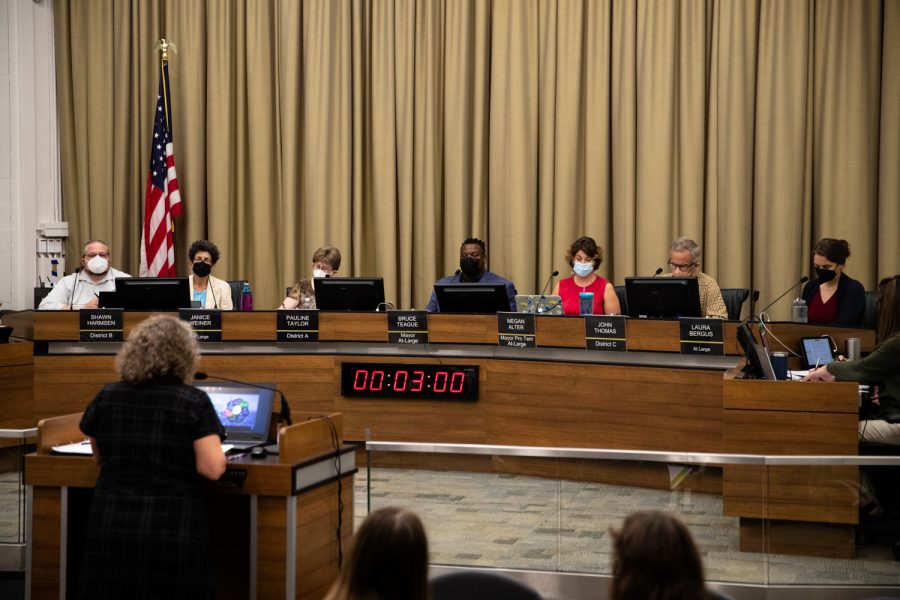IC approves fiscal 2024 budget
The budget was approved during the City Council’s meeting on April 4.
Shelter House executive director Crissy Cannganelli speaks at an Iowa City City Council meeting at City Hall in Iowa City on Tuesday, Sept. 20, 2022. Cangaenlli has served for the past 18 years at the Shelter House and attended the meeting as the City Council approved a collaborative plan with Shelter House helping to fund full-time civilian positions for homeless street outreach.
April 5, 2023
Iowa City City Council approved its fiscal 2024 budget during Tuesday night’s meeting, which the county auditor will certify on April 30.The budget passed with a vote of 6-1, with Councilor Laura Bergus in opposition.
Following public and council discussion, the Iowa City Police Department will see an increase of 5.8 percent to the public safety budget, making the total amount of money spent on public safety over $17 million. ICPD’s budget increased by 5 percent in 2021, marking the most it has increased in the last seven years.
ICPD has 79 sworn officers out of the 84 allotted to the department. Because of a staff shortage, the police department saw 18,500 hours of non-contract overtime. City Manager Geoff Fruin said during the meeting that the goal is to get to the minimum number of police officers to reduce overtime expenditures.
RELATED: Johnson County budget discussions to continue after new state law passed in February
City council also amended several areas of the budget increasing expenditures. New positions include an outreach engagement specialist, a full-time human rights engagement specialist, and a full-time grant coordinator, which are expected to increase spending by $265,000.
The city increased some utility and fee rates to increase revenue. Utilities were increased in areas regarding water, wastewater, recycling, and stormwater. The utility increases are as follows:
- 4 percent increase in the water rate
- 2 percent increase in wastewater rate
- $2 a month increase in recycling rate
- $0.50 a month increase in the stormwater rate
Fees will also increase for parking, refuse, and landfill utilization. A $5 increase will be put on the city’s monthly parking permit. Bulky items pick-up will increase by $7.50 for the first item as well as a 24 hour tag rate increase with $13.50 being the minimum charge. In addition, the minimum waste disposal fee will increase by $7.
The 5.8 percent budget increase will create a Half-Time Accreditation Manager Position, an Internal Affairs Lieutenant, a Sexual Assault Investigator Position, and a 31 percent wage increase to crossing guard.
Overall, the annual financial impact on residential households will increase by 3 percent for fiscal 2024.
With increasing utility and fee rates, the new budget will invest in several initiatives the city has been working towards in its fiscal 2023-2028 Strategic Plan.
The city has invested $10.7 million since fiscal 2018 to increase access to affordable housing. Investments in road maintenance and pedestrian access have increased, setting the stage for a zero-fare transit system. Another notable action is the utilization of ARPA funds to increase support systems surrounding small businesses.
Other areas funded include social service, climate action programming, and continuous preparation for the city’s facility needs.
Several financial challenges impacted this year’s budgeting process. The new 2023 state rollback legislation reduced taxes on residential properties by 2 percent that was introduced on Feb. 20, equating to roughly $1.7 million in lost revenue.
Additionally, losses are expected due to Iowa’s rollback of the 2013 State Commercial and Industrial Backfill, which reimbursed Iowa City for lost property tax revenue. Revenue will decrease by an estimated $1.5 million over the next five years. The city has also seen the lowest two-year taxable growth in a decade, further restricting expected revenue.



